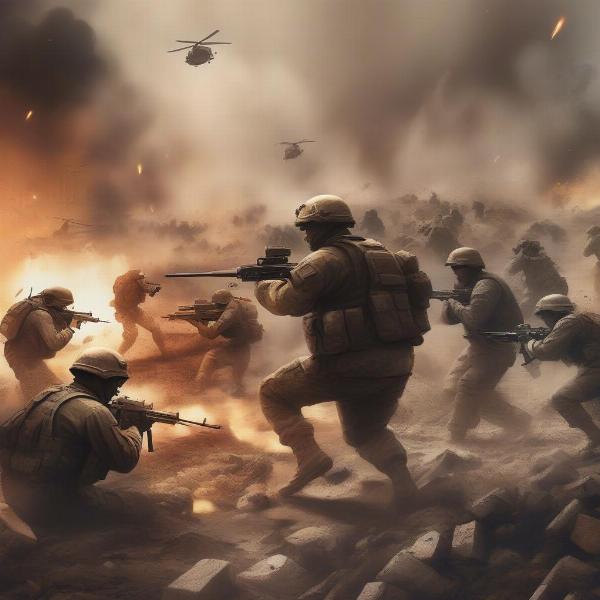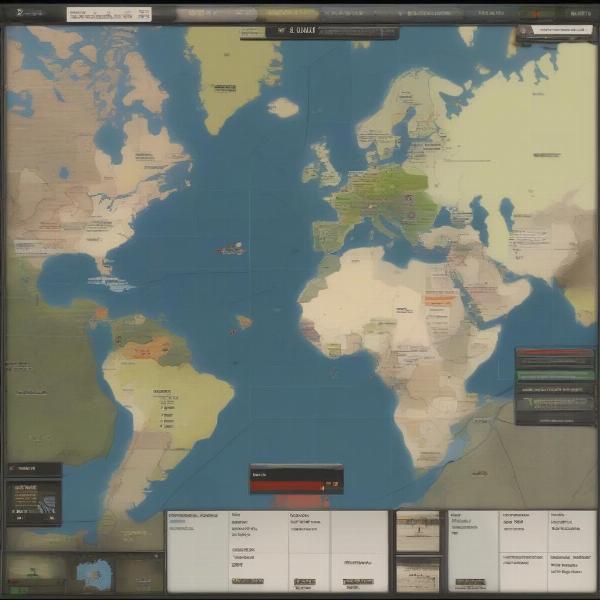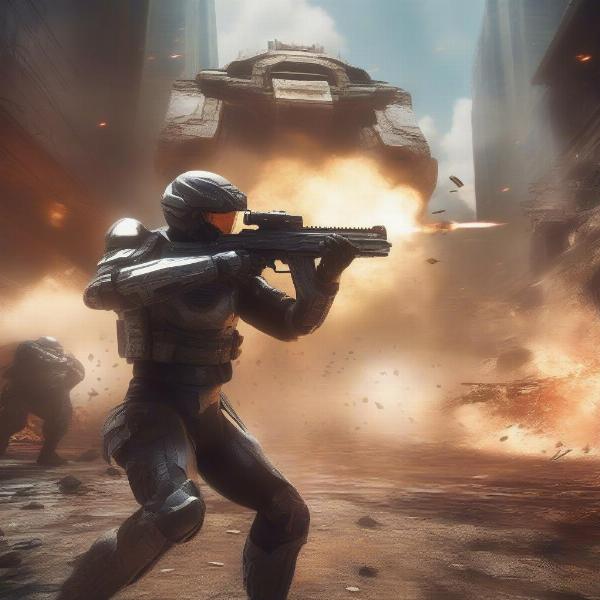The world of video games offers a unique lens through which to explore the complex realities of conflict. At supremeduelist.blog, we delve into the fascinating genre of Video Games About War, examining their mechanics, narratives, and the impact they have on players. From historical battles to futuristic skirmishes, war games provide a compelling blend of strategy, action, and sometimes, a sobering reflection on the human cost of warfare. We’ll uncover what makes these games so engaging and how they often shape our understanding of war itself.
This article will navigate through various facets of war-themed video games, exploring different subgenres, their historical contexts, and the technological advancements that have shaped their evolution. We’ll look at how these games utilize gameplay mechanics to simulate the brutal realities of war, offering a unique interactive experience. Additionally, we’ll examine the impact these games have on player perception of conflict and explore some notable examples within the genre.
What Makes War Video Games So Compelling?
War video games have carved out a significant space within the gaming industry, captivating players with their intense action, strategic depth, and immersive narratives. These games offer a unique experience, allowing players to participate in simulated conflicts, often based on real historical events or futuristic scenarios. The core appeal lies in the ability to make critical decisions, manage resources, and engage in tactical combat, all within a compelling virtual environment.
Several factors contribute to the compelling nature of these games. First, the historical setting is a powerful draw for many players. Being able to experience historical events firsthand, whether it is the trenches of World War I or the battlefields of World War II, provides an immersive and often educational experience. Moreover, the sense of agency and the ability to directly influence the outcome of battles is a central element of the appeal. Players feel a sense of responsibility and achievement as they guide their forces to victory. It’s a far cry from simply reading about war, it’s about living it, making tactical decisions, and feeling the weight of those choices.
 virtual soldiers fighting on a war battlefield
virtual soldiers fighting on a war battlefield
Different Subgenres Within War Video Games
The genre of video games about war is diverse, encompassing numerous subgenres that cater to different tastes and playstyles. First-person shooters (FPS) like Call of Duty and Battlefield dominate the market, offering fast-paced action and immersive combat experiences. These games typically focus on individual combat and close-quarters skirmishes. Call of Duty often portrays a modern or historical perspective with strong cinematic presentation, while Battlefield is known for its large-scale battles involving vehicles and diverse player roles.
Real-time strategy (RTS) games, such as Company of Heroes and StarCraft, take a more strategic approach, requiring players to manage resources, build bases, and command large armies in real-time battles. These games test the player’s tactical thinking and command abilities. Simulation games, like Arma and Steel Beasts, aim for maximum realism, offering complex simulations of military tactics, vehicles, and weapons systems. These games are favored by those seeking the most authentic war experience possible. There is also the turn-based strategy genre, such as the popular Civilization series and XCOM, which emphasize planning and calculated moves over real-time action.
Historical Accuracy vs. Gameplay Fun
A common point of discussion among gamers is the balance between historical accuracy and gameplay fun in war video games. Some games, like the Total War series, strive for historical realism, often sacrificing some accessibility for accuracy in unit types and tactics. Others prioritize fun and excitement over precise historical recreation. The debate often revolves around the question of how far to deviate from historical facts for the sake of entertainment. Many players recognize that there is often a necessity to sacrifice some realism for gameplay fluidity, while others emphasize authenticity as a core value. To truly understand, one should consider looking at the history of video games about the revolutionary war which often have their own challenges with regards to historical accuracy.
 military strategy game on a digital map
military strategy game on a digital map
The Impact of Technology on War Game Development
The evolution of technology has profoundly impacted the development of video games about war. Early war games, limited by hardware, focused on abstract representations and simple gameplay mechanics. As computing power increased, developers were able to create more detailed and immersive war simulations. Advancements in graphics technology allowed for more realistic rendering of environments, weapons, and characters, making the experience more visually captivating. The development of more sophisticated AI has led to enemies that offer more realistic and tactical challenges, adding to the sense of immersion and realism. Online multiplayer has transformed the genre, allowing players to compete in massive-scale battles and cooperative missions with friends and strangers from all over the world. The impact of advanced gameplay is undeniable and the growth of that has meant that the world of star wars video games ps1 has evolved significantly.
Ethical Considerations in War Video Games
The portrayal of war in video games also raises ethical questions. How do these games represent violence, and what impact does this have on players? Some critics argue that war games can glorify conflict, dehumanize enemies, and create a detachment from the real consequences of war. Others counter that these games offer a safe space to explore historical events and engage with the concepts of strategy and conflict. The reality is more complex, and often times the intent of a game designer is different from how a gamer might play it. A designer might be looking to portray a somber experience, while gamers might simply be focused on the adrenaline rush of a firefight.
Games vary in their approach to these ethical concerns. Some games choose to emphasize the human cost of war and the psychological toll it takes on soldiers. Others focus on the strategic elements and the challenges of command, or they might emphasize the technology and hardware side of things with games like the cruise ship wars video game. It’s important to note that these are all different sides of the same conflict and some games choose to portray a particular facet of this more than others. A responsible approach to gaming should include a critical evaluation of how war is represented and an awareness of the potential impact this might have on player perspectives.
 a close-up of a game character showing the intense emotional stress
a close-up of a game character showing the intense emotional stress
Notable Examples of War Video Games
There are many examples of war games that have made a significant impact in the industry, showcasing the diversity and depth of the genre. The Call of Duty: Modern Warfare series is notable for its cinematic presentation, intense action sequences, and multiplayer gameplay. The Battlefield series is known for its large-scale multiplayer battles and incorporation of vehicle combat. The Company of Heroes games are often praised for their tactical depth and strategic gameplay, placing a greater emphasis on cover and squad tactics than other RTS games. Meanwhile Hearts of Iron IV is known for being one of the most in-depth historical grand-strategy games out there, forcing players to consider every aspect of war and national management. These are just a few examples, and the genre continues to grow with innovative titles that challenge conventions and offer unique gameplay experiences. This does lead one to ask the question of what the next level is, and whether we might see the development of a prisoner of war video game which might explore the aspects of war that other games do not tend to focus on.
“Video games about war, when done well, offer an engaging, sometimes even educational, experience,” says Dr. Evelyn Reed, a game studies scholar. “They can encourage critical thinking about conflict and its consequences, while also delivering entertainment. It’s about how they are developed and how they are perceived that ultimately shapes the impact on players.”
“The key to making these games valuable is to go beyond simply glorifying combat,” adds Marcus Sterling, a veteran game designer. “We need to consider the ethical dimensions and portray war with a more complete and nuanced perspective.”
The Future of War Games
Looking ahead, the future of video games about war is likely to be shaped by advancements in technology and new approaches to storytelling. We are likely to see even more realistic and immersive simulations, thanks to advancements in virtual reality and augmented reality. The use of AI will also continue to evolve, allowing for more adaptive and challenging enemies. The way we tell stories and portray the effects of war will also likely change, as game developers continue to find new ways to engage and educate players. However, it’s important to note that if games aren’t created with care, they run the risk of potentially becoming a video game ruining star wars, or any other piece of media. Ultimately, the future holds many possibilities, and it will be fascinating to see how the genre continues to develop and change.
 futuristic war scene with hi-tech soldier
futuristic war scene with hi-tech soldier
Conclusion
Video games about war offer a unique and engaging way to explore the complex realities of conflict. From historical simulations to futuristic battles, these games provide a blend of strategic gameplay, intense action, and thought-provoking narratives. As technology evolves, we can expect even more immersive and challenging experiences. At supremeduelist.blog, we are committed to exploring these games and their impact on players, fostering critical engagement with the genre. We encourage you to continue your journey with us, exploring the diverse and fascinating world of gaming.
Leave a Reply